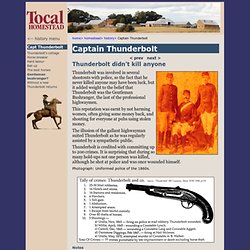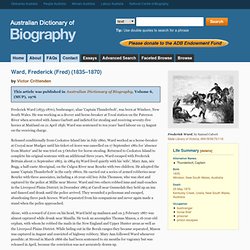

Captain Thunderbolt - Tocal's bushranger. Thunderbolt didn't kill anyone Thunderbolt was involved in several shootouts with police, so the fact that he never killed anyone may have been luck, but it added weight to the belief that Thunderbolt was the Gentleman Bushranger, the last of the professional highwaymen.

This reputation was earnt by not harming women, often giving some money back, and shouting for everyone at pubs using stolen money. Bushrangers: Frederick Wordsworth Ward alias Captain Thunderbolt. This photo was taken when he was dead or then again it may be his uncle Harry!

(read on to find out why) First of all I would like to say there is much contention and misinformation about Frederick Ward even including his date of birth and death. Frederick (Captain Thunderbolt) Ward. Frederick Ward (1835-1870), bushranger, alias 'Captain Thunderbolt', was born at Windsor, New South Wales.

He was working as a drover and horse-breaker at Tocal station on the Paterson River when arrested with James Garbutt and indicted for stealing and receiving seventy-five horses at Maitland on 21 April 1856; Ward was sentenced to ten years' hard labour on 13 August on the receiving charge. Released conditionally from Cockatoo Island late in July 1860, Ward worked as a horse-breaker at Cooyal near Mudgee until his ticket-of-leave was cancelled on 17 September 1861 for 'absence from Muster' and he was tried on 3 October for horse-stealing. Returned to Cockatoo Island to complete his original sentence with an additional three years, Ward escaped with Frederick Brittain about 11 September 1863. in 1864-65 Ward lived quietly with his 'wife', Mary Ann, née Bugg, a half-caste Aboriginal, on the Culgoa River near Bourke with two children. Citation details. Australian Crimes - BUSHRANGERS.